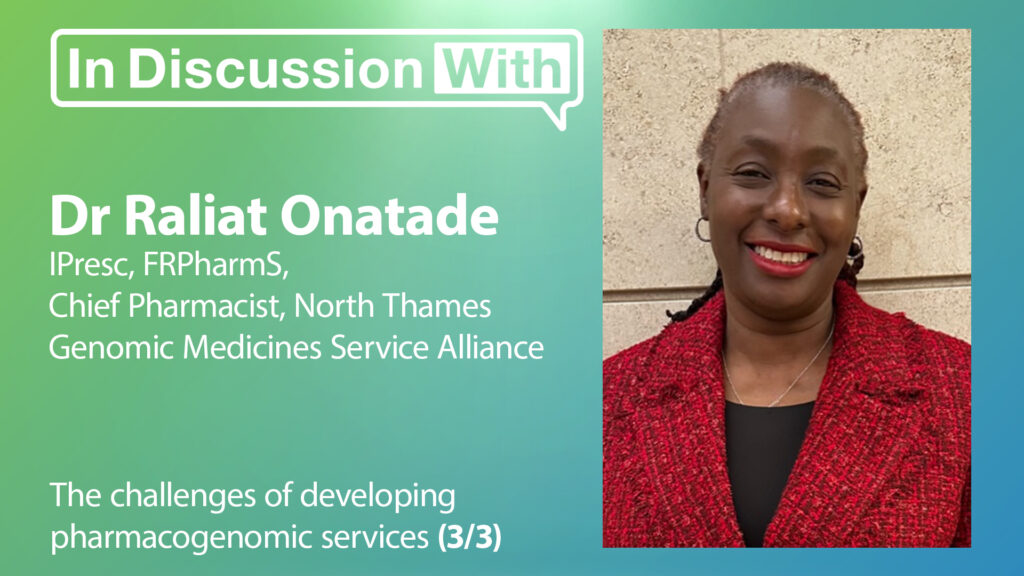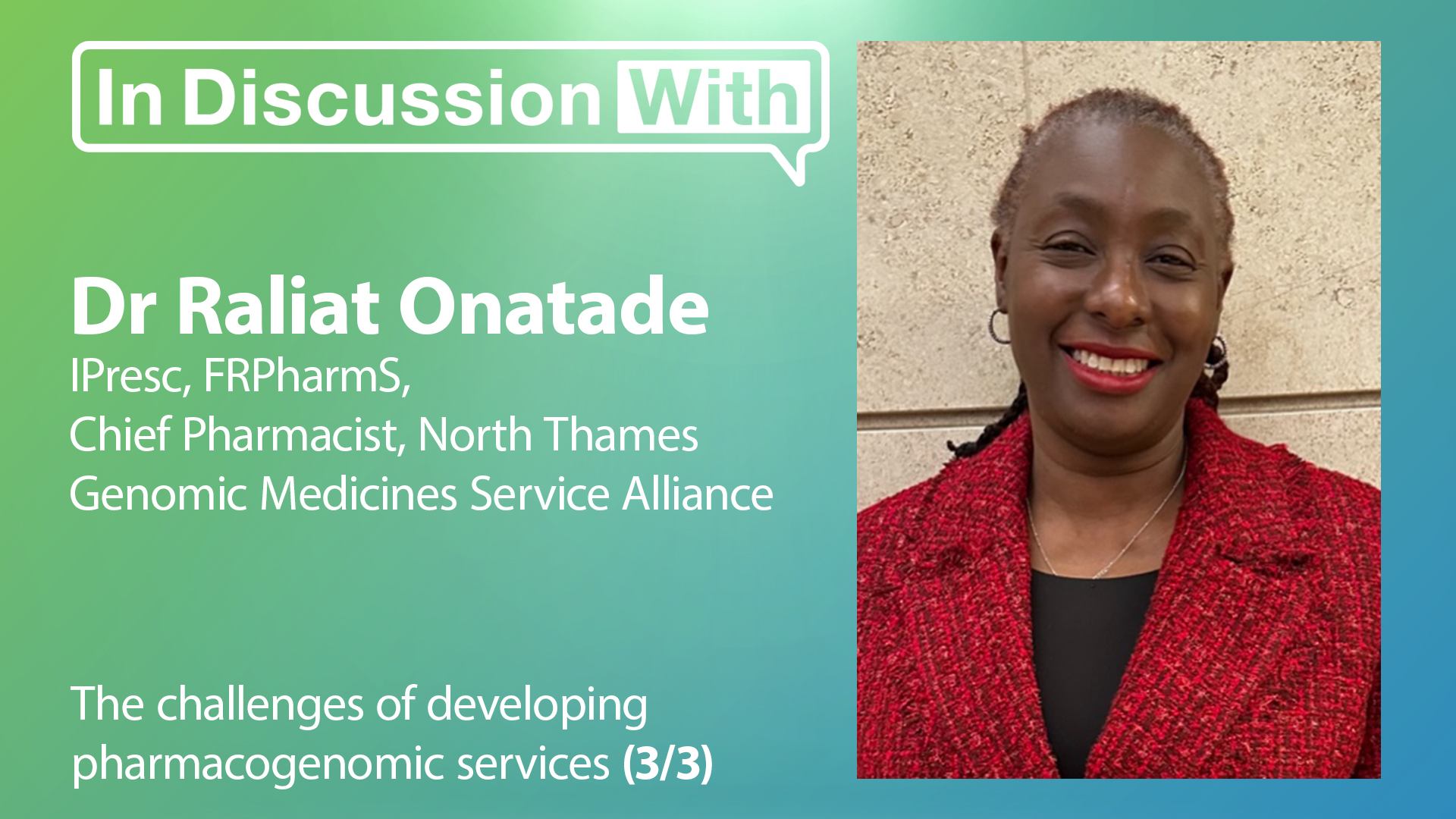
The challenges of developing pharmacogenomic services

Recent research has demonstrated the value of pharmacogenomics-guided prescribing but this is a far cry from the implementation of routine services. Dr Raliate Onatade Chief Pharmacist for North Thames Genomics Medicine Service Alliance, explains what is required and the challenges that need to be addressed.
[embedded content]
The PREPARE (PREemptive Pharmacogenomic Testing for Preventing Adverse Drug Reactions) study assessed the impact of pre-emptive pharmacogenomic testing on adverse event incidence in a randomised, cross-over study. A 12-gene pharmacogenetic panel was used to identify actionable gene variants and this was used to guide prescribing in the ‘test’ arm; the standard care arm did not receive pharmacogenomic testing.
“What they demonstrated was that there was a significantly reduced likelihood [of developing adverse reactions], if people were tested for these specific genes ahead of being treated with these medicines. So, what this says is that there seems to be a really good case for introducing some routine pharmacogenetic testing for these commonly-used drugs into normal treatment”, says Dr Onatade.
Implementation
The NHS is making huge strides towards the implementation of genomic services. The ambition for the NHS to become the first health service in the world to introduce genomic medicine into the mainstream of healthcare treatment. “Pharmacogenomics is absolutely fundamental to this as a branch of genomic medicine – so there’s a lot of work at the moment in terms of building the infrastructure. …….. So, we need to make sure there’s enough capacity in our laboratories in order to deliver these tests. There’s a question about whether or not, for example, people should be tested from birth or only when there’s a particular drug that’s needed – so lots of questions still to be still to be answered. I think that for pharmacogenomics in particular, then whenever I speak to other clinicians, other …. healthcare professionals, they’re really clear that leadership for pharmacogenomics must come from pharmacy – and I think that there’s a lot that we can do because we understand the medicines”, says Dr Onatade.
There is a need for education and training to ensure widespread understanding of the fundamentals of genomic medicine. Pharmacists, who already have experience of introducing new medicines into the health system, introducing new pathways, writing guidelines and talking to people about their medicines will now have to add genetic counselling to their repertoires, she suggests.
Another important aspect of these developments is understanding the cultural sensitivities – the importance of people’s values and beliefs when it comes to genomics and genomic medicine – “because it’s not quite the same thing as saying ‘we need to test your renal function before you we provide this medicine’”.
Dr Onatade explains: “What we really need to do is to embrace this because it’s not actually the future, it’s here now. It’s just going to get bigger and bigger and bigger and so we all need to embrace it and to understand the value of this and to be able to talk about it as [part of] normal standard care so that when people come to ask us then we actually have an answer to give to them. That really is what we’re trying to do within the Genomic Medicines Service Alliance – to really spread the knowledge, spread the training and encourage people to be familiar with pharmacogenomics and genomic medicine in general”.
When it comes to training there has been a drive to focus on newly qualified pharmacists and new entrants to the profession but pharmacists who are currently in practice also need to acquire a good understanding of pharmacogenomics because it is already becoming part of care –. “If you focus just on students and undergraduate teaching then we’ll be five years behind”, emphasises Dr Onatade.
Challenges
There are numerous challenges in the implementation of routine pharmacogenomic services; Dr Onatade identifies two critical aspects:
First – in order to be able to provide the correct and appropriate treatment for patients, pharmacists need to be able to interpret the pharmacogenetic reports and this calls for a basic level of understanding of some fundamental concepts. “That really is the key thing that you need to know so that when you see a report then you could really can understand what it’s telling you in order to advise the clinician or advise the patient on what it actually means and the implications for further treatment. – These reports can look quite daunting when you first look at them but actually after a while you begin to understand and pick out the really relevant and important parts to speak to the patients about”, she says.
Second – the informatics structure and processes need to be agreed. “What format is the information in? How does that information get into our patient record? How is that information shared? ….. How is it protected – bearing in mind that the information is about a person’s genetics data and stays with them for life. So, again it’s another consideration around making sure that the information is available but is also held very confidentially, but people can use it when needed at any point in our patient’s treatment throughout their whole lives”, says Dr Onatade.
About Raliat Onatade
Raliat Onatade holds three positions:
- Chief Pharmacist for Northeast London Integrated Care System
- Group Chief Pharmacist for Bart’s Health NHS trust also in East London
- Chief Pharmacist for North Thames Genomics Medicine Service Alliance
Dr Onatade’s EAHP keynote presentation can be viewed at https://events.eahp.eu/cmGateway/vimeoplayer.html?vimeoId=810496208
Read and watch the full series on our website or on YouTube.